Monsters & Mommis is a five-week miniseries celebrating queer horror. It’s Halloween month, so let’s plan our costumes, get slutty, and, of course, watch some scary movies. This week, three adaptations of Shirley Jackson’s classic novel: Robert Wise’s The Haunting (1963) starring Julie Harris and Claire Bloom, Jan de Bont’s The Haunting (1999) starring Lili Taylor and Catherine Zeta-Jones, and Mike Flanagan’s The Haunting of Hill House (2018) starring Michael Huisman and Kate Siegel.
The first time I saw a naked woman was in a horror movie.
I was 11 and I’d rented The Shining from Blockbuster. My parents had a rule that I could watch R-rated movies if they were based on a book I’d read and I’d just devoured Stephen King’s novel. I scurried to my room and popped it in my 13″ TV/DVD player combo.
I loved horror movies and horror books. I rarely got scared and when I did I enjoyed the feeling. But due to the oddly specific restrictions on my viewing the horror I’d consumed had been a mix of classics and corny PG-13 affairs. I’d yet to discover the potential for gore. I’d yet to discover the potential for sex.
The scene begins with Jack Nicholson investigating the haunted Room 237. He enters the bathroom and finds a woman lying in the tub. She’s young and bland and modelesque. He looks on practically salivating, his face like a cartoon wolf. She stands. She’s completely nude. She walks towards Jack and the camera and us.
I grabbed my remote control, finger on the off button, eyes darting back and forth between my bedroom door and the woman on the TV. I didn’t understand the feelings inside me. I’d never been so scared.
Jack meets her in the center of the room. They embrace. They kiss. My heart raced, sweat gathering between my hand and the remote.
Jack’s kiss is long and deep, until, suddenly, he stops. He looks in the mirror and the camera whips around to reveal the woman is a corpse, old and decaying… and laughing.
I jumped so suddenly that I fell off my bed. Smack onto the carpet. I lay there, face down, filled with giddy shame. The woman’s laughter continued.
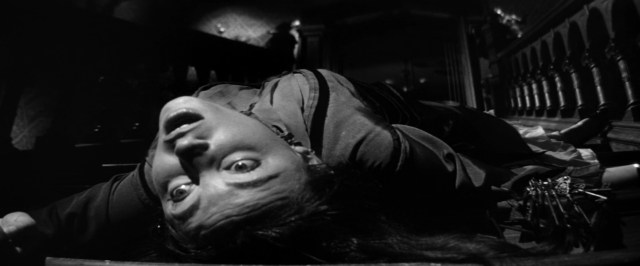
When you see a vagina for the first time
The Shining owes its existence to an earlier novel. Two decades before Stephen King invented a labyrinthine building haunted by the protagonist’s psychology, Shirley Jackson did the same. King called Jackson’s The Haunting of Hill House “one of only two great novels of the supernatural in the last hundred years.”
But where King’s novel reveals, Jackson’s holds back. Where King finds sex and fear and fantasy, Jackson finds subtext and terror and ambiguity.
Jackson’s novel has captivated readers and writers and filmmakers since its release. It’s influenced the genre through King and Kubrick and a long list of other famous (mostly male) names. It’s also directly been adapted for the screen three times by three different men.
They share the same house, the same skeleton, but thematically, stylistically, even narratively, little else. They’re drastically different works, but they do have one common thread. From 1963 to 2018, they all have a queer woman named Theo.
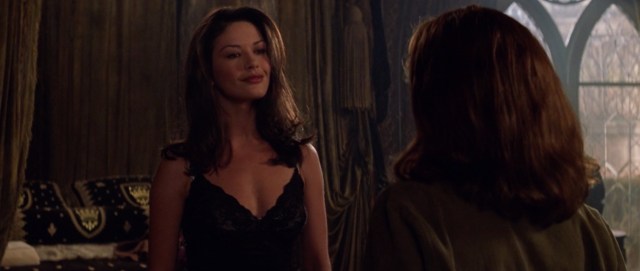
But only one has Catherine Zeta-Jones
The first adaptation is also the most loyal. Robert Wise got his start directing movies for Val Lewton, but eventually became known for classic musicals West Side Story and The Sound of Music. The Haunting falls somewhere in between.
Shot on 30mm anamorphic wide angle lenses that weren’t even officially approved for production, the movie has an epic (and distorted) feel to it. But learning from his low-budget roots, and the source material itself, Wise’s film knows when to withhold.
More than ghosts, this film is about the psychology of its lead character, Eleanor. Nell for short. She’s spent her entire life taking care of her demanding and critical mother, but now her mother has died. Racked with guilt and a loss of purpose, she eagerly signs up for Dr. John Markaway’s investigation into the paranormal history of Hill House.
Nell is a strange protagonist. Especially for a Hollywood genre film. She’s quiet and anxious. She’s bitter and unpleasant. She’s cold and desperate. Julie Harris is perfect in the role, never attempting to make Nell even the slightest bit charming.
Joining Nell at Hill House are Theodora, chosen for her ESP, Luke, the young man set to inherit the building, and Markaway himself. All the other expected visitors fail to show up out of fear.
From the moment she enters the house, Theo is oozing with sexuality. Her extrasensory perception doubles as a tool for flirting as she guesses Eleanor’s nickname and makes a comment about new clothes she senses Nell brought. By this point, Nell is just relieved to see another person. Her enthusiasm makes it seem like she might be flirting back and Theo responds with a glint in her eye.
Claire Bloom plays Theo with a casual confidence. She’s not a caricature of queerness or eroticism. She’s simply a woman who knows what she wants and who she is. The first night she invites herself into Nell’s room and when Nell refuses she easily responds, “Alright we have a date for breakfast.” Then she mentions that she approves of Nell’s secret plan to change her hair.
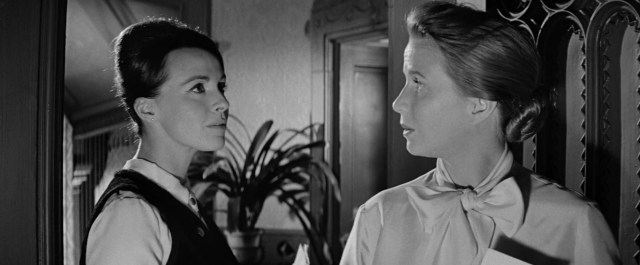
“What kind of haircut do you want? Do you want me to do it right now?”
That night they experience their first encounter. Theo screams and Nell rushes to her room. They huddle together on Theo’s bed, cold from the spectral presence, warm from each other. With only some turns of the doorknob, a few loud bangs, some interesting camera angles, and two committed performances, Wise creates a scene of absolute terror. And sex appeal. When the moment passes, they giggle together, in shock and sensual solidarity. The disbelief of a phantasmic orgasm.
This is the closest they’ll be. As the house increases its hold on Nell, she increases her resistance. She begins to obsess over a crush on Dr. Markaway and become cruel towards Theo. She tells Theo she’d rather be innocent than like her and when Theo asks for clarification Nell says, “Now who’s being stupid and innocent. You know perfectly well what I mean.” Later she adds, “The world is full of inconsistencies, unnatural things. Nature’s mistakes they’re called, you for instance.”
These bigoted turns are muttered with a frantic bitterness. She desperately wants to be accepted in this outside world, but she keeps manifesting justifications for why she might not be. Nell isn’t necessarily queer, but this film is still the most thematically linked to queerness. It uses Theo’s identity as a metaphor for freedom. Nell is in a sense closeted, if not from queerness, then simply from living. She’s so concerned about doing the right thing that she’s done absolutely nothing. Even the death of her mother, the first active choice of her life, was not something she initiated, but something she allowed to happen by ignoring her mother’s cries.
Until this fateful moment Nell had always done the right thing. But Theo’s entire life is wrong. And while Nell is falling apart due to this one, understandable, moment of weakness, Theo is completely unphased. If the lesson Nell needs to learn is to forgive her imperfections, Theo has surpassed her tenfold. Theo has learned, be it from confidence or ESP, that her imperfections aren’t imperfections at all. She’s just gay.
As Nell continues to descend into madness, or the house continues to grab hold of her depending on your beliefs, the style increases only slightly. There are brief moments of practical effects like when a wood door seems to bend like rubber. But mostly it’s just editing and camera work and Harris’ troubled performance.
By the time, Nell rebuffs Theo’s kindness for the last time and drives her car directly into a tree, the question of what exactly has occurred cannot be answered. Theo says maybe Nell will be happier staying with the house, even in death. Maybe it was her destiny. Or maybe she was simply unable to accept her inner truth, whatever that may have been.
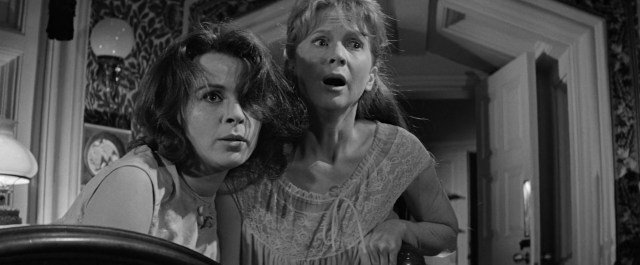
Sex Hair
Jan de Bont’s 1999 remake has a bad reputation likely because it’s bad. Known for the Speed films and gay classic Lara Croft: Tomb Raider – Cradle of Life, de Bont trades in the stylistic and thematic subtlety of the novel for big special effects and a convoluted plot. But any movie starring Lili Taylor that makes Owen Wilson play a character with his brother’s name and features a bisexual Catherine Zeta-Jones is not without pleasures.
This version starts almost exactly the same as the original. Nell’s mother has died and she lives with her sister and she’s miserable. But this time, it’s not a ghost study she signs up for but a sleep study. Dr. Marrow is investigating fear and he needs unwitting subjects. He invites a group of people to Hill House with the intention of dropping subtle hints about its haunted origin and hoping their imaginations get the best of them.
While Bloom’s Theo presented a grounded sexuality, de Bont and Zeta-Jones have none of these concerns. She enters the film wearing a black mini dress, tights, black boots, and a feathered red jacket. She says she packs a lot, because asking people to carry her bags is how she makes friends. She quickly tells Nell that she has a boyfriend and a girlfriend and she’d love for them to all live together if they could just get along. She changes in front of Nell getting off on her discomfort.
It would seem that Theo’s sexuality has benefited from the thirty plus years between adaptations. Her ability to bluntly say she has a girlfriend is new at least. But as the film goes on her bisexuality feels less like a part of her identity and more like a coded way of saying she’s promiscuous.
During the repeated scene where she and Nell huddle together on their first haunted night, the intimacy is gone. There’s a scare and the women jump apart instead of together. And after this scene, Theo seems to lose all interest in Nell, focusing instead on Owen Wilson’s Luke. The tender queer flirting of the original is replaced with adolescent expressions of heterosexuality.
The subtlety of the horror is gone as well. Statues move and ghosts appear in bed sheets. The late 90s CGI is fun and silly, but quickly grows tedious as the movie goes on and on. Most of the second half is just Nell running around trying to solve the mystery of the house. She discovers that one of the ghosts of Hill House was her great grandmother, an unnecessary justification for her destined presence. The film ends with her getting the main bad ghost trapped in the wall, freeing the ghosts of a lot of children, and killing herself. Her own ghost floats to the sky in a moment that would be funny if you weren’t so desperate for the movie to end already.
The greatest joys of this thematically empty movie arrive in its most explicit moments: Theo’s sultry opening scenes and towards the end when Owen Wilson is suddenly decapitated.
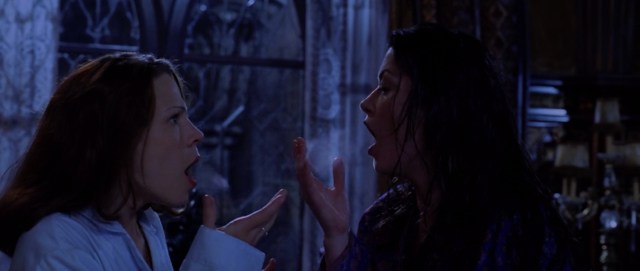
When your hands are cold but you’re a considerate partner
Last October, Netflix released a ten-episode adaptation of Hill House. Horror director Mike Flanagan’s radical take on Jackson’s novel abandoned and morphed much of the original story. Rather than focusing on one troubled young woman, he instead created a family. There is still a Nell, a Luke, and a Theo, but who they are is vastly different.
The show jumps between the past and the present. In 1992, Hugh and Olivia Crain move into Hill House with their five children: Steven, Shirley, Theodora, Luke, and Nell. They’ve been flipping houses: moving into places with potential, fixing them up, and selling them for a profit. They’re only supposed to be at Hill House for a summer.
The first half of the show spends an episode with each sibling. We begin with Steve, the skeptic. On their last night in the house, Steve slept through the chaos that led to his mother’s death, and he maintains everything that occurred can be blamed on mental illness. And yet he’s a famous horror novelist who used the lore around his family to sell paperbacks.
Shirley thinks of herself as the responsible sibling and chose an even more morbid profession. She and her husband run a funeral home where he’s front of house and she’s downstairs prepping bodies.
Theo lives in Shirley’s guest house despite having a PhD and a job as a child psychologist. She’s gay in the Shane McCutcheon sort of way, picking up women and then quickly putting them down. She wears gloves that she removes only to shake the hands of her young patients.
Luke and Nell are twins. Luke has spent most of his life battling drug addiction, going in and out of rehab, and alienating himself from everyone in the family. Nell has had an equally troubled life. Haunted by visions of what her child self named “The Bent-Neck Lady,” she’s lived a life in dread. Her brief moment of happiness vanished when her husband dropped dead within a year of their marriage. She spirals. Her episode ends with her returning to Hill House and being hung from the floor where her mother jumped.
These episodes range in quality and the back half of the show struggles to sustain itself. It’s not that the show isn’t good. It’s very good, and, at times, even great. But Flanagan overestimates our investment in all the characters, or, I should say, my investment in all the characters. And as the ghosts become more explicit, and the barrage of special effects no longer illicit fear, the characters are all we have.
With Nell dying in the middle of the series, the emotional arc of the show shifts to Hugh and Steve. Whereas the novel and the two films are centered around a uniquely disturbed female character, Flanagan’s ensemble begins and ends with the men. Hugh sacrifices himself to the house in the presence of his eldest and Steve accepts the truth of his family’s trauma. The show opens with Steve, it closes with Steve, and, I regret to say, Steve is even less interesting than his name.
It’s not that Flanagan’s approach is inherently wrong. Just like it wasn’t inherently wrong for Bradley Cooper to take a three film Hollywood legacy about a female star in an abusive relationship and make it about an alcoholic male rocker. But it is disappointing given the revolutionary nature of both the novel and the original film. It’s also disappointing considering how good the show is when it does focus on Jackson’s two women.
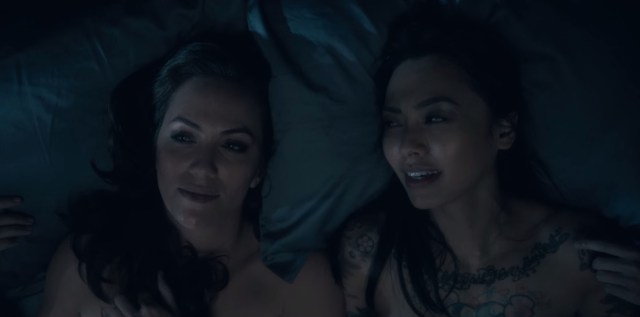
“I think you should wash those gloves.”
The best episode of the show is almost definitely the one about Nell. But I think the missed potential is even clearer in my personal favorite, Theo’s episode: “Touch.”
It begins with a brief scene where 1992 Theo comforts her sister through a nightmare. Nell grips her hand tighter and tighter until Theo pulls away. She realizes in horror that nobody is in bed with her. At least nobody living. We then go to the present where Theo is comforting someone once again, this time a patient, a young girl who speaks of a specter named Mr. Smiley haunting her new foster house.
Theo explains to the girl that it’s normal to put up walls when scared; it’s normal to disassociate. Gloveless, she shakes the girl’s hand and seems disappointed by the experience. We learn the reason for the gloves is ESP. Usually, by touching someone she can understand their deepest pain. It’s why her mother gave her the gloves, a wall of her own. But with this girl she gets nothing.
Because of her present-day cool girl exterior, Theo’s flashbacks are the most revealing. We watch a portrait of a precocious child who has decided her family’s well-being is entirely her responsibility. Shirley may take on the role of caregiver, but it’s actually Theo who managed the emotions of her siblings. Living in Shirley’s guest house may seem like a result of arrested development, but it’s really a way for Theo to keep an eye on her sister.
Theo’s ability to see the pain of others with merely a touch becomes a metaphor for anyone who grew up in an abusive household, hyperaware of conflict, taking on everyone’s burden as their own. She carries within her a frantic desire to make things right. Her father may spend his whole life declaring, “I can fix it,” but Theo knows those who can actually do it, don’t say it out loud.
We learn that Theo came out to her family by fucking a bridesmaid at Nell’s wedding. There’s a lack of vulnerability to this approach, keeping this part of herself hidden for so long only to brazenly flaunt it as if it’s not a big deal. When she has sex in the present with a one-night-stand named Trish, she keeps her gloves on and continues this lack of vulnerability. For her sex isn’t about connection, it’s about distraction.
Troubled by the little girl and Mr. Smiley, she makes a sudden house visit. She awkwardly asks if she can see their basement to better understand the girl’s imagined trauma. Lying on the basement couch, she removes her gloves. She grips and feels and hurts. Back upstairs, gloves still off, she shakes the foster father’s hand. And then she really knows. This man has been molesting the girl. She’s taken the pain in exchange for knowledge.
The episode ends with Theo having sex with Trish again, this time without gloves. She tells Trish to touch her and we sense the start of a crumbling wall. But the moment doesn’t feel triumphant. It’s sad. The first steps towards abandoning our defenses are the hardest and Theo has so much further to go.
Kate Siegel is incredible in this episode and in the show as a whole. Theo is always sharp and cool in the presence of others, but her subtleties manifest so differently depending on people’s needs, and her willingness to open up to these needs. She’s a complicated character in the most complicated moment of her life, and Siegel portrays all of this with a watchable ease. And in this particular episode, written by Elizabeth Ann Phang, Siegel is given writing to match her performance.
It’s a shame then that the finale gives her such an empty final dream sequence. It’s a shame her story ends with her committing to Trish and throwing out her gloves. It’s a shame such a complex character is wrapped up neatly in a montage while her brother monologues.
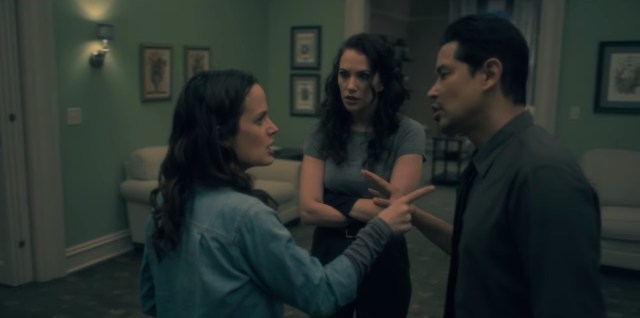
Homosexual exhaustion
The history of horror cinema is filled with queer women, but almost all of it was made by men. And almost all of it lives in subtext.
There’s nothing inherently lesser about this approach. As far as I’m concerned, the original adaptation remains the most accomplished. It’s less a question of whether subtlety is superior to explicitness and more about which stories and approaches and characters are given the freedom for this explicitness. Which stories get a naked woman kissing the protagonist before turning into the demon of their nightmares. Which stories get to rise above an ensemble. And which stories instead are forced to live exclusively in subtext and supporting roles.
As The Haunting of Hill House has found new life across decades, the queerness has become more explicit yet less important to the overall work. This doesn’t have to be the case. The most recent adaptation was a radical reimagining. That’s what I want: radical reimaginings. But the radical reimaginings I envision are ones that center queer women, not a man named Steve.
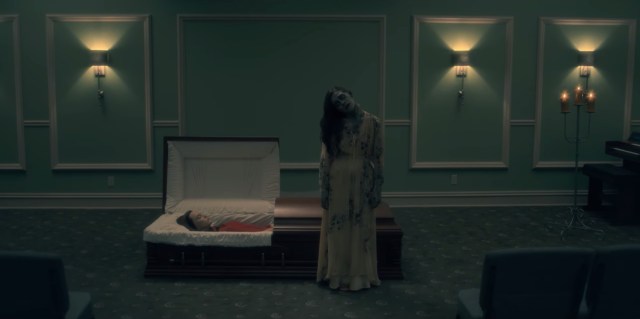
Why can’t they see us? We’re right here.



“the radical reimaginings I envision are ones that center queer women, not a man named Steve.” HEAR HEAR
Im reading the book for my book club right now, so I rewatched the series last week and the Catherine Zeta Jones movie this weekend. At apparently 1 hr 53 minutes it was somehow the longest movie I have ever seen? I did feel like by the end of that movie Theo was very tender will Nell, but it was also steeped in so much nonsense at that point that I couldn’t really tell if it was on purpose or if it meant anything at all. The best part of that movie is near the beginning when that lady who is NOT Gabrielle Carteris gets hit in the face with the piano wire.
As for the series, besides being an asshole of a character and being boring by nature of being a white man named Steve, I really think that character is just redundant. He brought nothing that Shirley didn’t also bring, except Shirley was complex and interesting. She could have taken on the few Steve things that actually mattered and it wouldn’t have had to alter the course of the show at all. Plus they could have chopped off at least one episode, and I think running a little tighter would have done it some good. But I really do love it. Best Mrs. Dudley for sure.
That’s true CZJ’s Theo does come around at the end but it really does feel so absurdly long by then it feels pointless.
I think even keeping Steve if the show had been eight episodes instead of ten it would have been significantly better.
Drew, did you see We Have Always Lived in the Castle? I love the book, but the movie just seemed bleah and I only watched a few minutes of it. If you have I’d be interested to hear your thoughts.
I never saw the 1999 version, thankfully, but I agree with the rest of your assessment, and yes please, “not a man named Steve” in any future works!
I haven’t seen it! But it’s on my list so I’ll let you know when I do.
I AM SO HAPPY YOU DID THIS.
I’ve been reading the novel on and off all year. I’m thirty-two, and in the novel, so is Eleanor, so it feels like something important that keeps calling out to me.
As much as I love Wise’s film–along with “The Innocents,” it’s my favorite horror film, I’ve always been very upset that they rewrote Eleanor as having a crush on Dr. Markway/Montague. In the novel, it’s blatantly Theo she’s in love with–there’s even a scene with them wandering outside in the dark, where they’re struggling to admit it, and even though Eleanor tries several times to work up a crush on Luke, it’s Theo she asks to follow home. Theo, of course, refuses, and it’s one of the last gestures that really destroy Eleanor.
I still hold out hope that one day, someone will make a “Hill House” that keeps their relationship intact in all its bruised, fumbling glory.
Love this! The original film is amazing. I enjoyed a lot of the series, but it felt like they just haphazardly tacked on bits from the novel, and I haaaated the ending.
The Haunting of Hill House is one of my favorite novels of all time. Would highly recommend for a Halloween read! Nell is such a painfully lonely character, and reading her POV hurts every time.
FAVORITE INSTALLMENT OF THIS INCRED SERIES
Great article! I’ve never been a horror fan, but now I’am curious to watch the original movie.
I’ve watched the series last year but I really hated where things went after episode 7 or 8? That thing that happened in the the basement between Theo and her brother in law was the true horror, it haunted me for days! Why did they have to do that?!
Looking forward to the next installments!
Theo is one of the greatest lesbian characters of all time. She’s no nonsense and unapologetic about who she is. She also sees Nell not so much as a potential lover, but as someone she can empathize with. That she casually flirts with Nell is all the more delightful, she knowing that Nell hasn’t had a date or an orgasm in years. I love their back and forth. That being said, they completely ruined the subtlety of the dance between them in the remake.
Great work as usual Drew.
I just finished rewatching The Haunting of Hill House, as I’d plan to way back since the unfolding, intersecting storylines made it hard to process all that happened. Plus the the atmosphere and shocking turns were just AMAZING. Was able to retain a lot more this time, but something still puzzles me.
When Theo was trying to tell Shirley what with her brother-in law, why didn’t she even once say that you know I liked women? Yes Shirley seemed to have a harder time accepting her sister was gay than the rest of the family, but she was fully aware of it. At no point was there any suggestion that Theo had previously been with a man and even Hugh says there mother seemed to know when Theo was only eight! Was Theo just too overwhelmed by all that had happened to explain what happened or how it tied to her abilities? While the actress did an extraordinary job of building up the story to gut-wrenching, heartbreaking conclusion, that little lack of candor is still confusing.
It’s true that subtext and limited focus on queerness doesn’t necessarily lesson the character’s value, but it seemed strange this was one time where it really could have been relevant to the central sibling relationship yet never comes up.